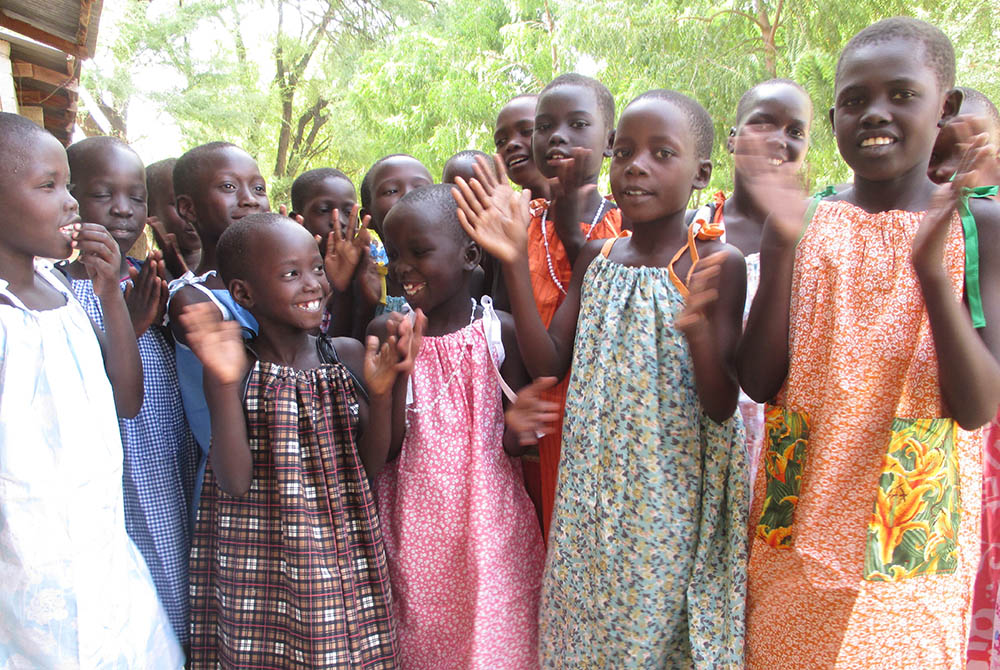
Girls from different ethnic groups attend the St. Bakhita Primary School in Narus, South Sudan, in a program supported by Mercy Beyond Borders. The school is one of South Sudan's best examples of students from diverse ethnic groups living and studying peacefully side by side. (Courtesy of Mercy Beyond Borders)
Jubilation marked celebrations that caught the world's attention 10 years ago when South Sudan formally became independent from Sudan on July 9, 2011, following a protracted, decadeslong war of independence.
"There was much fanfare," recalls New Zealand Sr. Margaret Scott, a member of the Sisters of Our Lady of the Missions, and former principal of Solidarity Teacher Training College in Yambio, South Sudan.
But this month's commemoration of the 10th anniversary of what is still the world's youngest country is overshadowed by uncertainty, violence and ongoing humanitarian challenges.
"A decade later ... pervasive insecurity — in particular intercommunal violence — continues to obstruct the realization of a durable and sustainable peace," the United Nations News Service said in a June 21 report.
Sisters with experience in South Sudan agree and acknowledge these grave disappointments, particularly political and ethnic violence that has killed hundreds of thousands and caused more than 2 million to flee the country. As noted by the International Rescue Committee, South Sudan "enjoyed two years of fragile peace before political rivalry erupted once again into open conflict in 2013, leaving an estimated 380,000 dead and 2 million displaced. 2.2 million people have been forced to flee to neighboring countries."
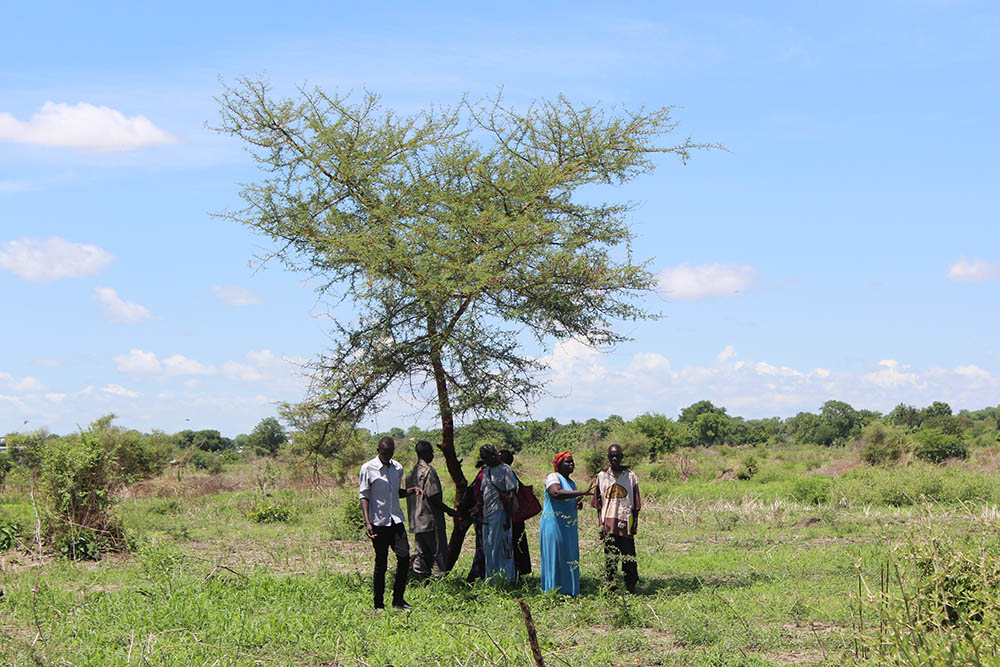
Residents of the tiny village of Kabu, South Sudan, stand under a shade tree in 2017. In villages like Kabu, food security remains an important priority. (GSR photo/Chris Herlinger)
"Corruption is endemic and intranational conflicts, economic collapse, crime and hunger ravage the population," said Sr. Joan Mumaw, president and chief administrative officer for the Maryland-based Friends in Solidarity, the U.S. partner to Solidarity with South Sudan, a collaborative ministry of religious congregations of men and women.
"Flooding, drought, the pandemic and you have a national tragedy and perhaps a failed state," said Mumaw, a member of the Sisters, Servants of the Immaculate Heart of Mary, or IHM Sisters, of Monroe, Michigan.
Sr. Marilyn Lacey, executive director of the international nonprofit Mercy Beyond Borders, notes that much of the news about South Sudan has gone unnoticed by the world's media, including "internal displacement of millions from their homes; acute hunger in large swaths of the country; refugee flows into Uganda — over 1 million — and Kenya and Sudan."
Lacey, a member of the Institute of the Sisters of Mercy of the Americas, added: "Besides the obvious trauma in the midst of all this, there is the resultant impossibility of farming, the breakdown of any systemic medical care or vaccinations, the interruption of education, and nongovernmental organizations fleeing the country."
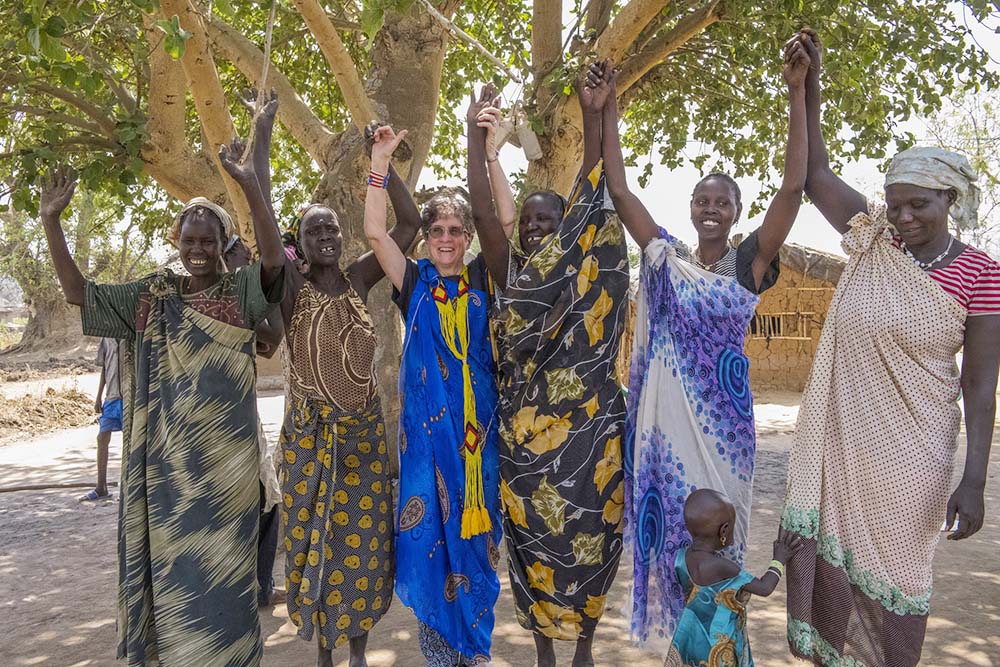
Mercy Sr. Marilyn Lacey of Mercy Beyond Borders with South Sudanese refugee women of various ethnic groups in Boroli Refugee Camp, Adjumani, Uganda. (Courtesy of Mercy Beyond Borders)
To mark this anniversary, GSR asked sisters who have worked in South Sudan to reflect and assess where the country stands now.
Besides Lacey, Mumaw and Scott, participants included:
- Sr. Bakhita Francis, a member of the Missionary Franciscan Sisters of the Immaculate Conception who currently works for the Yambio-Tombura Diocese in Yambio, South Sudan;
- Sr. Edith Mary Natuhwera, the bursar of St. Bakhita Girls' Primary School in Narus, South Sudan, and a member of the Missionary Sisters of Mary Mother of the Church, based in Lira, Uganda.
- Sr. Scholasticah Nganda, a Kenyan member of the Congregation of the Sisters of Mercy who is the director of the Good Shepherd Peace Center in Kit, South Sudan.
- Sr. Barbara Paleczny, a Canadian School Sister of Notre Dame and trauma specialist who worked with Solidarity with South Sudan from 2008 to 2020.
The sisters responded to the questions either by email or by interview on Zoom. Responses have been edited and condensed.
GSR: How do you assess the state of South Sudan now, 10 years after independence? What progress has been made and what are the continuing challenges?
Lacey: There has been some progress since independence, but it is minimal and decidedly fragile. The positives include some investment in infrastructure, such as roads, bridges, cellphone coverage and internet access, and noticeable, albeit slow progress in promoting girls' education, but that has been inconsistent.
'When South Sudan became a country in 2011, the country was doing well. However, 10 years after the independence, the country has declined drastically.'
—Sr. Bakhita Francis
The negatives, in my view, far outweigh the positives. These include massive violence since December 2013, when fighting broke out again between Dinka and Nuer groups in Juba and then spread everywhere, to the point where there are now multiple heavily armed splinter groups conducting raids, burning villages and the like without any apparent command and control or actual military hierarchy. They are more like proxy gangs fighting for cattle, land and wealth.
Finally, there is crippling corruption at every level, from oil contracts to road construction to border guards. The international attempts at peace talks devolved into a stalling technique where the political elites stay in fancy hotels and make promises they never intend to keep. The wealthy elite, of course, profiting from illegal gain, buy homes in other countries and send their families abroad for schooling and safety.
Governments and large funders would do better to channel their resources to nonprofits who are truly doing good work on the ground despite constant difficulty and real danger.
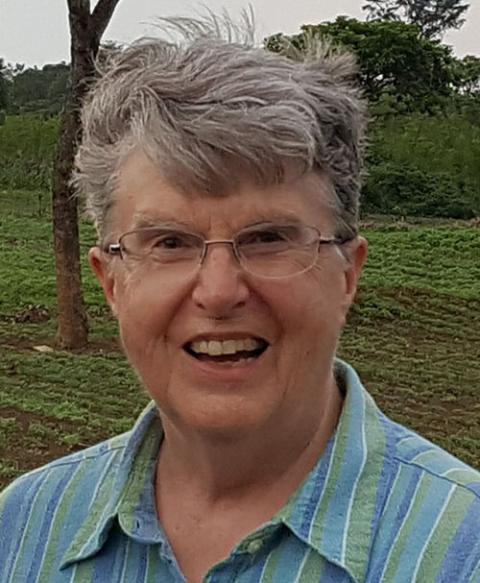
Immaculate Heart of Mary Sr. Joan Mumaw (Courtesy of Joan Mumaw)
Mumaw: A cease-fire between different factions is in place at the national level, but subnational conflicts [local conflicts over land, cattle, pasture and other disputes] persist. The implementation of the peace accord signed in September 2018 has stalled. The international community has continued to pressure all parties to implement the agreement, and a transitional government of national unity was finally installed in February 2020 and only within the last month has the new legislative body been seated.
But governance is still in a "developmental stage." Attempts to develop a national integrated army have stalled — fragmentation among political parties and in the Sudan People's Liberation Army and various militias associated with generals and political parties are common.
Paleczny: Overall, I find the situation extremely tragic, because there was great enthusiasm around the voting for independence, and the election, and the celebration, and the hopes. But the tribal warfare and the continuing violence is extreme, as is the famine.
Political leaders are using humanitarian needs to gain dominance and control a country. Food becomes a weapon of war: Some get food and some don't. The U.N. says that eight and a half million in South Sudan are facing catastrophic famine. And that just helps continue the violence.
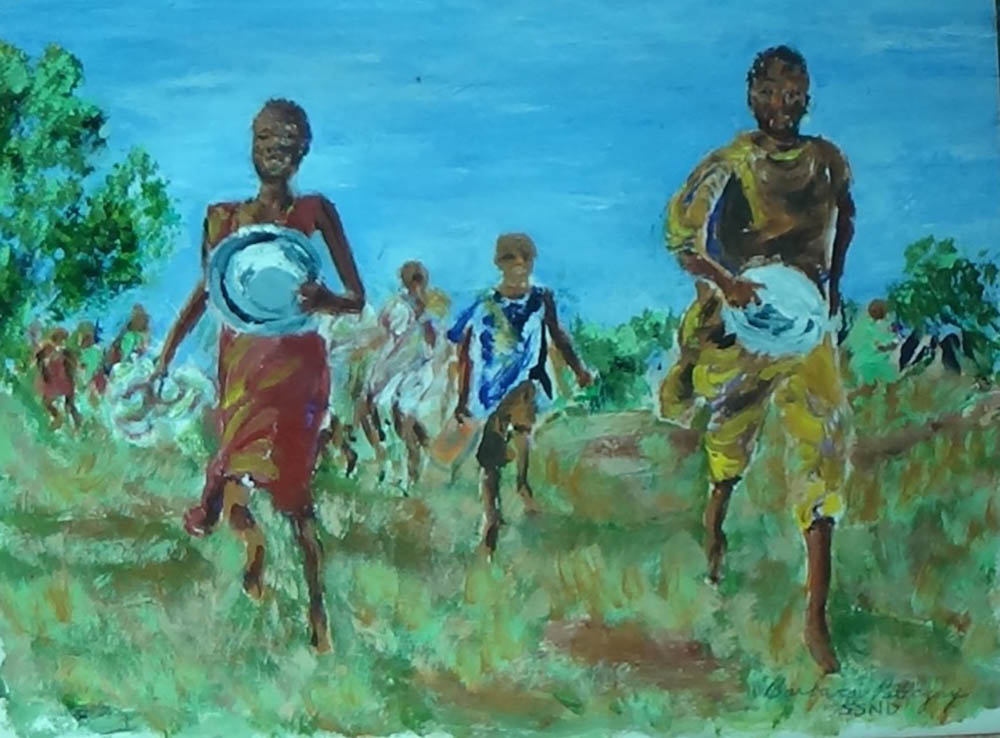
A painting by Sr. Barbara Paleczny, a Canadian School Sister of Notre Dame, depicts children in South Sudan running to receive food at a feeding program. (Courtesy of Barbara Paleczny)
Are you disappointed at the way continued conflicts have seemed to prevent much "nation building" or real improvement in the livelihoods of those in South Sudan? What have been the major impediments to making improvements?
Francis: When South Sudan became a country in 2011, the country was doing well. However, 10 years after the independence, the country has declined drastically — it has become like stagnant water. The most serious issue is violence.
South Sudan has a lot of potential if South Sudanese work together as one people to overcome the challenges of political power struggles, nepotism, land grabbing, the feeling that one group is superior to another, ethnic identity, child marriage and revenge killings.
I think all of these challenges are because the country didn't address the trauma from the 21-year civil war with Sudan. Since there was no trauma healing, the people are still living in the civil war, which is why killing, arbitrary and forced disappearances are still seen as the only way to solve problems. In a way, South Sudanese were not well-prepared for the separation from Sudan.
Advertisement
Lacey: "Disappointed" doesn't begin to cover it. "Appalled" would be closer. The political leadership is riddled by greed, power-grabbing and corruption. There is, in fact, no real sense of a country at all, though there was some glimmer of that among the general population back in 2011, so relieved that war was over, so happy about forging a better future.
Instead, in the absence of an external enemy, South Sudan's leadership perpetuated and stoked interethnic rivalries once again. This remains the key problem impeding true peace and any real development. Until the various ethnic groups recognize advantages in working with one another instead of continuing the dominant "revenge culture," there will never be peace in South Sudan.
Mumaw: South Sudan seemed to be a land of promise at the time of independence. It is rich in natural resources, oil and minerals and agricultural potential. But corruption, civil war and sub-national ethnic conflicts are major impediments to development. The lack of physical and institutional infrastructure and structures for governance have also hindered economic development and good governance.
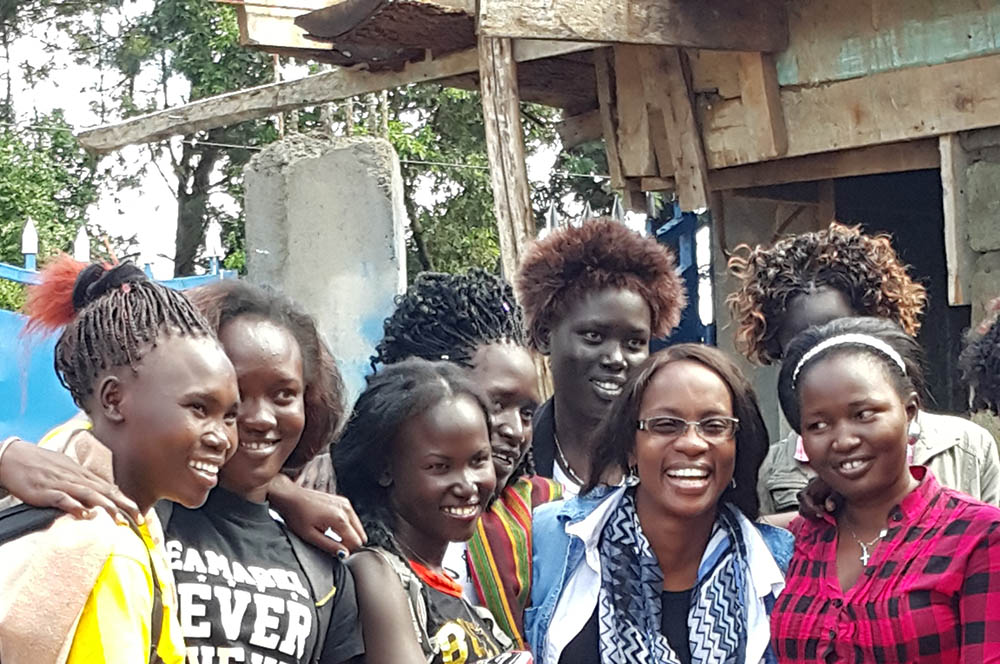
Mercy Beyond Borders' University Scholars Program provides academic scholarships and leadership training for female high school graduates with strong academic performance in South Sudan. Shown here with scholars at a leadership training is Teresa Samuel-Boko, in blue, a Mercy Beyond Borders board member from South Sudan. (Courtesy of Mercy Beyond Borders)
How would you assess the state of education, particularly for girls, in South Sudan?
Nganda: The education system in South Sudan is in dire need of support. Due to poverty, 90% of the children in South Sudan do not have access to education. I don't think the government of South Sudan has invested in education. The school system is very poor and sufficient infrastructure is not in place.
Primary school teachers are not trained properly. Graduates of the Solidarity Teacher Training College in Yambio find themselves among the few qualified primary school teachers the country has. Their impact continues to be monumental.
Scott: I think everyone is disappointed that the conflicts continue and as a result affect education. Very few children start school at 5 or 6 and continue through until completion uninterrupted. If it is not the problem of paying school fees, there are the challenges of hunger, fighting, flooding, illness and so on. There are always major factors in play to prevent education occurring smoothly.
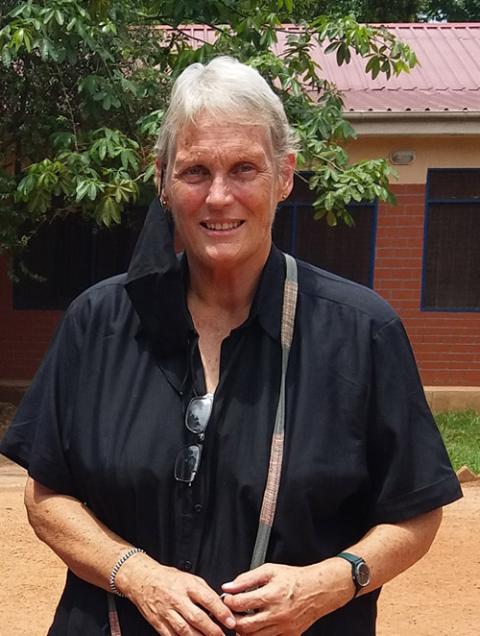
Our Lady of the Missions Sr. Margaret Scott (Courtesy of Margaret Scott)
So many young people approached me over the years seeking school fees. They had no parents, or parents with many children and so could not afford to pay the fees. Many worked for a year, studied the following year and then worked again in order to raise the money to pay the fees. So many continued the struggle until completing the school learning and then aimed to go higher. But for so many that was a pipe dream.
Girls and women are hugely disadvantaged in terms of education opportunities and Solidarity established a special program to help women enter the teaching profession. They came to the college wanting to be qualified teachers, leaving their own husbands and children at home so as to do this. The sacrifices made were enormous but so many of the female students persevered in the struggle in order to ensure a better future for their children.
The problem of violence in the country seems considerable, particularly between ethnic groups. Have efforts by the church and others to promote a culture of peace been successful, even in small ways? Might a talked-about visit by Pope Francis help in these efforts?
Lacey: Bishop Emeritus [Paride] Taban's efforts to broker dialogue and understanding between and among ethnic groups has been laudable, such as the Holy Trinity Peace Village he founded in Kuron, South Sudan. But progress is slow, and I don't see many similar efforts. The churches themselves are riven by ethnic frictions.
I have great admiration for Pope Francis; his gesture [in 2019] toward the warring leaders by kissing their feet stunned everyone. But a visit would likely only be showcased by the political leaders and not lead to any real change. Better that he work on conversion among this own clergy and bishops. Perhaps he could fund Solidarity with major grants from the Vatican.
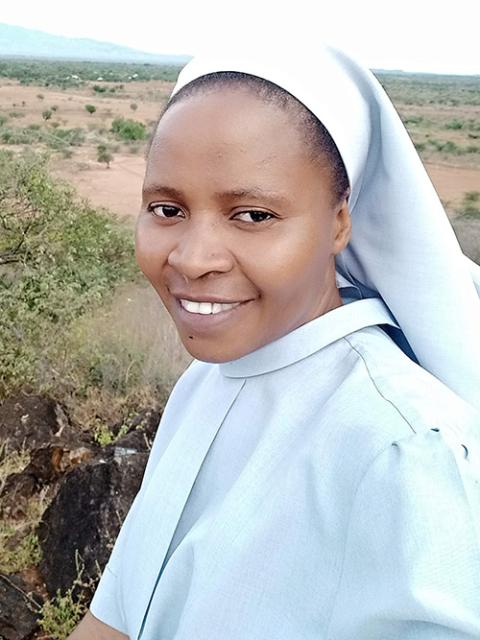
Sr. Edith Mary Natuhwera of the Missionary Sisters of Mary Mother of the Church (Courtesy of Edith Mary Natuhwera)
Natuhwera: In some places like Narus, where I live, there have been great efforts. My congregation, the Missionary Sisters of Mary Mother of the Church, has been here 27 years and has faced all trials courageously. Thanks to Bishop Paride Taban for planting the seed in this land and accepting to be flogged in all ways. Some religious have been flogged, beaten and even killed but have never given up because they knew the seed they were planting would never wither. That's why it is possible that in some places peace does exist.
Scott: A visit from Pope Francis would be a boost to the people of South Sudan as it would demonstrate significantly that somebody cared about a country where people are incredibly resilient.
Are there stories that we journalists have missed that deserve attention?
Paleczny: One thing that is underreported in the West is about the struggles of day-to-day life. When you have a lack of waste disposal you get garbage everywhere in Juba. Doctors told me there's such an abundance of skin disease, because of the air pollution. What do you do with the plastics? They burn them. Or the computer parts. And the Nile is a dumping ground and is becoming a sewage area.
It's such a sad situation, in about almost every way I can think of, unless I look at the people themselves, and then I have a very different perspective — much more positive. Yet there are such challenges. One of our teachers, his mother was 44, in the hospital for four days with appendix trouble, but there was one surgeon in Bor, and she died because she couldn't get surgery. It's ordinary things like that that are so tragic.
What do you see as the legacy of your group or community's work in South Sudan and your continued role there?
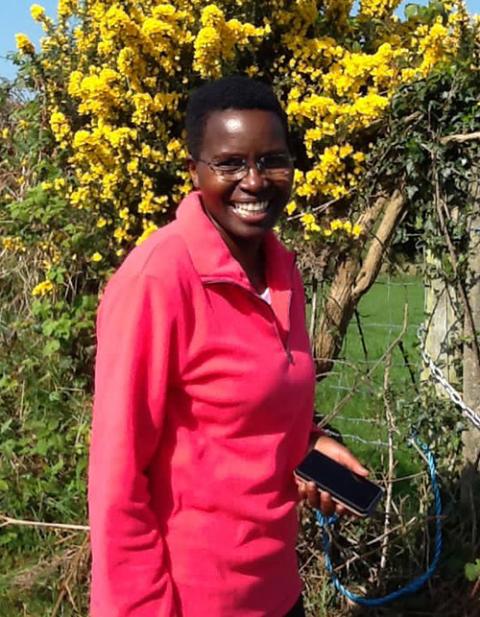
Mercy Sr. Scholasticah Nganda (Courtesy of Scholasticah Nganda)
Nganda: The immense contribution Solidarity with South Sudan is making in capacity building of personnel for the local church and the country as a whole will remain as the legacy of Solidarity's presence in South Sudan. In collaboration with the bishops of Sudan and South Sudan, Solidarity continues to support and empower a struggling church to fulfill her mission of liberating herself from poverty.
Scott: Solidarity with South Sudan's teacher training college in Yambio has trained primary school teachers from all over the country. The students when applying often say they want to help their younger brothers and sisters by educating them.
They are aware that teachers are generally not valued yet within the society and are certainly poorly paid, but they want to give of what they have to bring about a better future for following generations. The teachers return to their communities after graduation and then passionately teach the next generation trying to provide good education so that change will take place in South Sudan. The graduates leave the college with an expectation that life will become better and that fighting and occurrences of violence will cease.
Final thoughts as we mark the 10-year anniversary?
Lacey: As someone who has worked with displaced populations from dozens of countries, I can say that South Sudanese women are exceptionally strong, bright and resilient, despite their lifetimes of trauma from war and their cultural oppression — they are considered by men to be worth less than cows and are treated as such. I am constantly inspired by them.
We would all do well to recall the wisdom of [philosopher] Martin Buber that "success is not a name of God." We work not to save the world, but to witness to the God who dwells among us all. We announce that presence by the quality of our presence: other-centered, welcoming, inclusive, peaceable, affirming, compassionate, resource-sharing, hope-filled. That kind of success in South Sudan is not what the world usually measures.
Mumaw: The people of South Sudan are resilient. They have dealt with armed conflict, the imposition of Sharia law [by Sudan] and Arabic. They have taken refuge in surrounding countries and then moved back to their homes in southern Sudan and rebuilt their homes and livelihoods. South Sudan had little physical or institutional infrastructure when it opted to become independent in July 2011. There was nothing in place for the South to become a nation.
It continues to be an uphill climb for the over 60 ethnic groups to come together to form a nation. But I do find hope — hope in the young people, graduates of our multicultural institutions, who have come to know, appreciate and respect colleagues from different ethnic groups. They are the leaders and creators of this new nation, South Sudan.
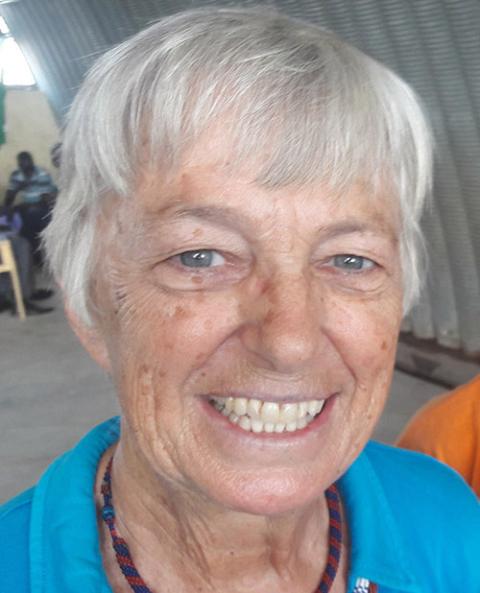
Sr. Barbara Paleczny of the School Sisters of Notre Dame (GSR photo/Chris Herlinger)
Paleczny: When I was in South Sudan, I'd walk the streets, maybe praying my rosary, maybe not. But with the mysteries of Christ's life and death and looking around, I would ask, "What is resurrection?" And I'd see all the people in the market or on the street or whatever, and I'd ask that question. It was easier to see what is crucifixion and sorrowful mysteries, but all the mysteries, what are they here and now?
So it's that kind of integration, or eucharistic, that we are bread that is broken. We are the blood poured out. We are God's expression, so it gives us other vision, and still the realities of what we suffer there together.
But it was a privilege to be in South Sudan. Every single day it was a privilege. Living with the rats and bats and lizards and scorpions in my bedrooms. Content with little, and in these remote areas, it's a challenge beyond anything I have here in Canada. But it was a privilege: The body of Christ becomes real. The faith becomes real. It's so real.





